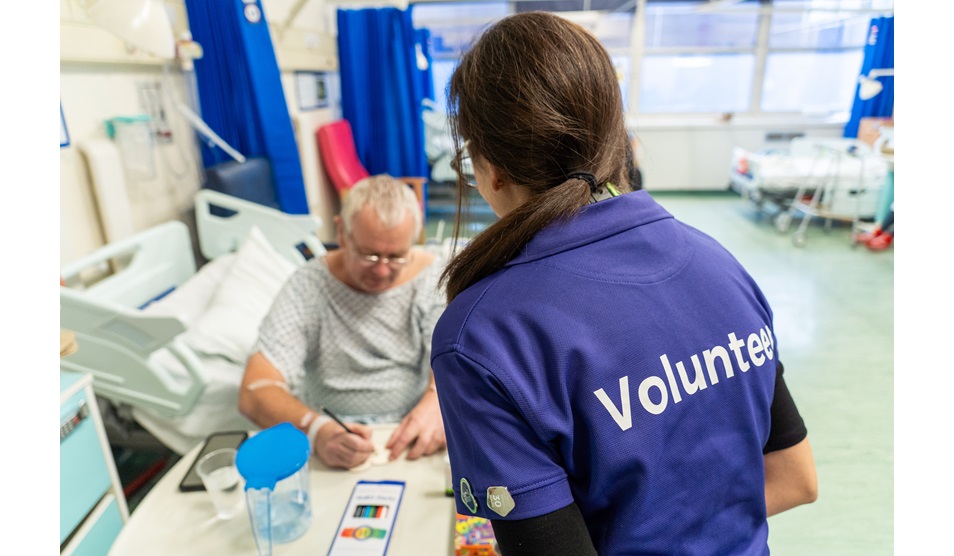Trust Mary Seacole Scholar publishes report about experience of minority ethnic nursing associates
A new report, written by a research nurse at Imperial College Healthcare NHS Trust, explores the experiences of a group of nursing associate staff from minority ethnic backgrounds and proposes improvements to help ensure this relatively new role and staff in the role can maximise their potential.
The report is part of the Mary Seacole Foundation’s Development Award, which was awarded to Carolyn Spring at Imperial College Healthcare in 2019. Carolyn joined the Trust as a research nurse in 2017 and was awarded again in 2020 by Imperial Healthcare Charity with a pre-doctoral fellowship to continue her work on the role of nursing associates.
Currently, around 65 per cent of nursing associates entering the nursing associate scheme are from minority ethnic backgrounds. NHS England Workforce Race Equality Standard data demonstrates consistently that these ethnic groups face discrimination and greater barriers to progression.
Eight nursing associates from minority ethnic backgrounds were either interviewed or completed a survey and provided details about their experiences for analysis. Five main themes were identified:
- Lack of understanding from colleagues about the role – the nursing associates felt that their role was constantly being negotiated and sometimes there was pressure to work beyond the parameters to meet expectations.
- A mismatch in perceptions of the role – the participants tended not to view their role as ‘bridging’ between a healthcare assistant and registered nurse, as it was established. They felt they embodied many registered nurse responsibilities when caring for patients.
- The importance of interactions with patients – the nursing associates were passionate about patient care and much of their professional validation and confidence comes through these interactions.
- Ethnicity and raising concerns – the nursing associates were less likely to voice concerns about the emotional challenges they may be facing, such as experiences of racism, discrimination or the pandemic.
- Challenges of working during the pandemic - the nursing associates, like many NHS staff, worked in new ways during the Covid-19 pandemic, which created anxiety and desire for changes to practice.
As a new staff group, the participants suggested they often felt like trailblazers as there was no one else embedded in the role for them to look to as an example. Importantly, the report noted strong ambition and a desire from the nursing associates to make sure that the role was successful. The report makes several key recommendations for improvement and to provide more support nursing associates from minority ethnic backgrounds.
The nursing associate role was introduced in England in 2017 in response to the Shape of Caring review, published in 2015 and led by Lord Willis of Knaresborough to ensure that nurses and care assistants receive consistent high-quality education and training. The role was designed to be a ‘bridging role’ that enabled the career progression of healthcare support workers and facilitated registered nurses to take on more advanced tasks. Imperial College Healthcare became a pilot site for the nursing associate programme in 2019.
Recommendations from the report include acknowledgement of the challenges faced by nursing associates, support and recognition for their contribution, collaboration between policy makers, and employers to improve role clarity and professional identity, development of ambassador and mentorship schemes, increased visibility of training and development opportunities, improved monitoring of the wellbeing of nursing associate staff and better access to resources that provide support and safe spaces to voice concerns.
Commenting on the report, director of nursing Professor Janice Sigsworth said: “Nursing associates are highly valued members of our team, providing vital, high-quality care for patients and allowing registered nurses to focus on other key areas of care. As the role is so new, research like this provides us with valuable insight on the experiences of our staff that helps us understand what is working and what is not working so that we can make improvements, both for the wellbeing of our staff and for patient care.
“We are very proud of Carolyn’s contribution as a Mary Seacole scholar and are reviewing her report in detail to ensure that we take on board all the findings and recommendations. As well as investigating some of the specific issues that have been raised, such as examples of discrimination, we are also taking steps to respond to and address some of the wider challenges and ultimately improve the experience of our staff so they can continue to provide excellent care, while also feeling supported.”
The Trust has already taken a number of steps in response to the issues raised in the report, including:
- Improving signposting to resources for nursing associates, including career routes
- Improving information available for all staff about nursing associates to assist in improving wider understanding of the scope of the role
- Promoting opportunities for nursing associates to be involved in shared decision making as part of the pathway to excellence programme
- Developing a single point of contact for nursing associates to raise concerns or discuss issues and get advice
Commenting on her report, Carolyn Spring said: “Enormous gratitude is owned to the study participants for sharing their time, insight and experiences. This research has highlighted a number of key issues that need to be addressed in order to support the wellbeing and equitable development of our minority ethnic nursing associate staff. This report has offered some initial insights but more work is needed to fully explore how this new role is embedding itself in our NHS. It is encouraging to see Imperial College Healthcare beginning to respond to some of the concerns addressed in this study.”
Carolyn will be doing more research on the views of healthcare assistants and registered nurses about the nursing associate role, funded by Imperial Heathcare Charity. The findings will help further improve understanding of this new role. Please email carolyn.spring@nhs.net if you would like to be involved.





